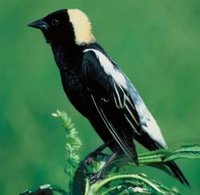 As the naturalist John Burroughs seems to have been well aware, bird-songs change and evolve over time. The songs we hear today may be quite different from the songs of a hundred years ago. Regions may develope their own dialects. Here Burroughs returns home to listen to the birds of his youth again and receives a pleasant surprise.
As the naturalist John Burroughs seems to have been well aware, bird-songs change and evolve over time. The songs we hear today may be quite different from the songs of a hundred years ago. Regions may develope their own dialects. Here Burroughs returns home to listen to the birds of his youth again and receives a pleasant surprise.Nearly every May I am seized with an impulse to go back to the scenes of my youth, and hear the bobolinks in the home meadows once more. I am sure they sing there better than anywhere else. They probably drink nothing but dew, and the dew distilled in those high pastoral regions has surprising virtues. It gives a clear, full, vibrant quality to the birds' voices that I have never heard elsewhere. The night of my arrival, I leave my southern window open, so that the meadow chorus may come pouring in before I am up in the morning. How it does transport me athwart the years, and make me a boy again, sheltered by the paternal wing! On one occasion, the third morning after my arrival, a bobolink appeared with a new note in his song. The note sounded like the word 'baby' uttered with a peculiar, tender resonance: but it was clearly an interpolation; it did not belong there; it had no relation to the rest of the song. Yet the bird never failed to utter it with the same joy and confidence as the rest of his song. Maybe it was the beginning of a variation that will in time result in an entirely new bobolink song.
The Writings of John Burroughs. Houghton Mifflin: Boston and New York, 1905. "Bird-Songs". XII, 36.
Also from the Library of Babel:
- Pierce Butler, Fanny Kemble, et al. July 22, 2020. ‘“An attempt of the Pennsylvania Supreme Court to make a way around the original Fugitive Slave Law, of 1793, by finding a private agent guilty of kidnapping for having remanded a slave from Pennsylvania to Maryland was forcefully overturned by the U. S. Supreme Court in Prigg v. United States (1842).”’
- Burroughs' Receives Intelligence About the High Hole. Here the naturalist John Burroughs publishes the account of a young correspondent who has tamed a high-hole (a.k.a. yellow flicker, northern flicker, Colaptes auratus).
- Burroughs Observes a Gourmet Robin. The naturalist John Burroughs marvels over a robin with a curious menu item.
- Be sure to check out the Browser's Guide to the Library of Babel.


No comments:
Post a Comment